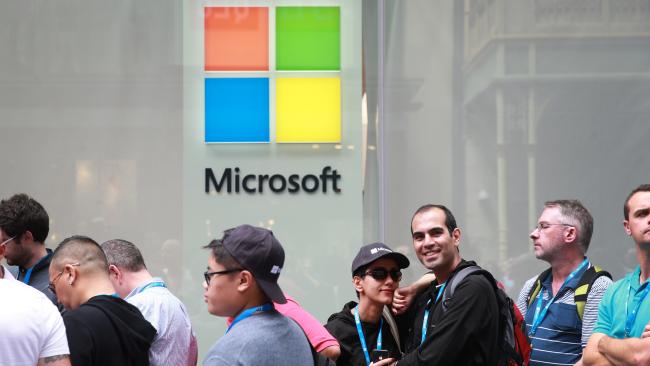Microsoft restores bitcoin payments after ‘working to ensure lower amounts would be redeemable’

MICROSOFT has resumed accepting bitcoin as payment after temporarily halting transactions in the “unstable” cryptocurrency earlier this week.
Since 2014, the software giant has allowed users to add money to their Microsoft account using bitcoin, but has temporarily stopped supporting bitcoin twice in the past, once in 2015 and once in 2016.
The move this week, first reported by Bleeping Computer, was due to the “unstable state of the bitcoin currency”. In a statement to news.com.au on Wednesday, a Microsoft spokeswoman confirmed the suspension but said the service had now been restored.
“We’ve restored bitcoin as a payment option in our store after working with our provider to ensure lower bitcoin amounts would be redeemable by customers,” she said.
It came as JP Morgan boss Jamie Dimon said he regretted calling bitcoin a “fraud” last year. “The blockchain is real, you can have crypto dollars and stuff like that, ICOs [initial coin offerings] you’ve got to look at every one individually,” he said in an interview with Fox Business.
“The bitcoin to me was always what the governments are gonna feel about bitcoin as it gets really big, and I just have a different opinion than other people. I’m not interested that much in the subject at all.”
Skyrocketing fees and long transaction wait times have made it increasingly difficult to carry out day-to-day commerce using the bitcoin network, which is struggling to process more than four transactions per second.
Bitcoin users can choose to add an optional fee to a transaction. The higher the fee, the more likely the transaction will be accepted by the “miners” — the computers which continually verify and add to the blockchain — and so make it into the next “block”.
As more investors pile into bitcoin, competition for the limited space in each block has pushed up average fees, forcing users to choose between paying the price or waiting hours or days for their transaction to go through.
Or in the words of one Reddit user, “The fees are too damn high.”
A number of rival cryptocurrencies, including ethereum, ripple and controversial offshoot bitcoin cash, tout lower fees and wait times than bitcoin, which has rapidly lost market share — down from around 87 per cent of the crypto market one year ago to 36 per cent today.
In December, video game company Valve said it would no longer support the currency on its Steam distribution platform “due to high fees and volatility”.
“Transaction fees that are charged to the customer by the bitcoin network have skyrocketed this year, topping out at close to $US20 a transaction last week (compared to roughly 20 cents when we initially enabled bitcoin),” the company said in a statement at the time.
“Unfortunately, Valve has no control over the amount of the fee. These fees result in unreasonably high costs for purchasing games when paying with bitcoin. The high transaction fees cause even greater problems when the value of bitcoin itself drops dramatically.”
Bitcoin’s meteoric rise in value, from under $US1000 one year ago to around $US15,000 today, has also been marked by extreme volatility, with swings of up to 30 per cent in a single day.
“This creates a problem for customers trying to purchase games with bitcoin,” Valve’s statement last month said. “When checking out on Steam, a customer will transfer X amount of bitcoin for the cost of the game, plus Y amount of bitcoin to cover the transaction fee charged by the bitcoin network.
“The value of bitcoin is only guaranteed for a certain period of time so if the transaction doesn’t complete within that window of time, then the amount of bitcoin needed to cover the transaction can change. The amount it can change has been increasing recently to a point where it can be significantly different.
“The normal resolution for this is to either refund the original payment to the user, or ask the user to transfer additional funds to cover the remaining balance. In both these cases, the user is hit with the bitcoin network transaction fee again.
“This year, we’ve seen increasing number of customers get into this state. With the transaction fee being so high right now, it is not feasible to refund or ask the customer to transfer the missing balance (which itself runs the risk of underpayment again, depending on how much the value of bitcoin changes while the bitcoin network processes the additional transfer).
“At this point, it has become untenable to support bitcoin as a payment option. We may re-evaluate whether bitcoin makes sense for us and for the Steam community at a later date. We will continue working to resolve any pending issues for customers who are impacted by existing underpayments or transaction fees.”
Meanwhile, camera company Kodak on Thursday announced it was launching its own “photo-centric” cryptocurrency dubbed KodakCoin to “empower photographers and agencies to take greater control in image rights management”.
“For many in the tech industry, ‘blockchain’ and ‘cryptocurrency’ are hot buzzwords, but for photographers who’ve long struggled to assert control over their work and how it’s used, these buzzwords are the keys to solving what felt like an unsolvable problem,” Kodak chief executive Jeff Clarke said in a statement.
“Kodak has always sought to democratise photography and make licensing fair to artists. These technologies give the photography community an innovative and easy way to do just that.”